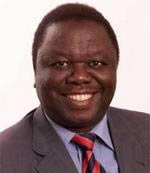2011-07-19 No Prosecution of Morgan Tsvangirai
 Morgan Tzvangirai will not be prosecuted, a Zimbabwean panel has determined, in connection with comments he made to US diplomats, revealed in cables published by the Guardian.
Morgan Tzvangirai will not be prosecuted, a Zimbabwean panel has determined, in connection with comments he made to US diplomats, revealed in cables published by the Guardian.
The Financial Gazette, a Zimbabwean English-language news weekly, reports:
A PANEL set up early this year to probe alleged treason by Prime Minister Morgan Tsvangirai and leading ZANU-PF critics, has recommended that there are no legal grounds to prosecute individuals on the basis of accounts contained in WikiLeaks files, The Financial Gazette has established. The panel, set up by Attorney-General (AG), Johannes Tomana, was composed of some of the country's top legal minds, in terms of Section 76 of the Constitution, to sift through the WikiLeaks cables for possible breach of the country's laws.
In January, the potential charges against Tzvangirai were seized upon in a Guardian opinion piece by GOP public relations consultant James Richardson, who proceeded to argue that any harm that might come to Morgan Tzvangirai would be attributable to Wikileaks as "collateral damage," since, he argued, Wikileaks had failed to redact information that might incriminate the Zimbabwean PM.
The article caused a small controversy because in its zeal to criticize Wikileaks it glossed over severe inaccuracies. The initial point of publication for the original Tzvangirai cable, 09HARARE1004, had been The Guardian, and not Wikileaks, and - because of the the publication arrangement between Cablegate media partners - it was the Guardian which had failed to redact the information that had allegedly incriminated Tzvangirai.
WL Central covered the story as it happened, here. ZunguZungu also wrote an informative piece about how Richardson's piece was culpably simplistic in its treatment of political realities in Zimbabwe, such that it appeared to be mere opportunism. Glenn Greenwald covered the controversy here. The falsehood, that it was Wikileaks that was primarily responsible for the unredacted cable, however, was repeated casually throughout the online news arena.
The controversy eventually elicited corrections, a retraction and a high profile piece drawing attention to the issue, and acknowledging the hypocrisy of the Guardian.
Despite the lack of a clear argument against Wikileaks, the incident remained a favourite case for critics of Wikileaks, who, in their attempts to brand Wikileaks a dangerous and reckless organization, run up against a severe shortage of evidence of actual harm caused by Wikileaks.
The news that the investigation - commissioned by the Zimbabwean Attorney General Johannes Tomana - has concluded that there are insufficient grounds for prosecution of Tzvangirai conclusively ends this controversy. No harm will come to Tzvangirai because of the negligence of the Guardian. There is no longer any blame to shift to Wikileaks.
The news of the collapse of the investigation into Tzvangirai will likely see vastly less attention, however, than stories attributing sensational blame to Wikileaks. As evidenced by today's suspiciously partial WSJ article - where Bret Stephens defended criminal activity in the News of the World by drawing a moral equivalence between phone hacking and public interest whistleblowing - corrupt and lazy journalism does not scruple from the redeployment of discredited falsehoods:
But you can also see why the distinction between the Public Interest, loftily defined, and what actually happens to interest the public, not-so-loftily defined, is a piece of rhetorical legerdemain that masks a raw assertion of privilege. Was it in the higher public interest to know, as we learned from WikiLeaks, that Zimbabwe's prime minister and opposition leader Morgan Tsvangirai was privately urging U.S. diplomats to hold firm on sanctions even as he was saying the opposite in public? No. Did the public want to know about it? No. What did this particular WikiLeak achieve? Nothing, except to put Mr. Tsvangirai at material risk of being charged with treason and hanged.
Concern for the wellbeing of Morgan Tzvangirai is laudable, and it is to be hoped that critics of Wikileaks will share the relief that there is no longer any risk of harm to him, regardless of how it might undermine their case.